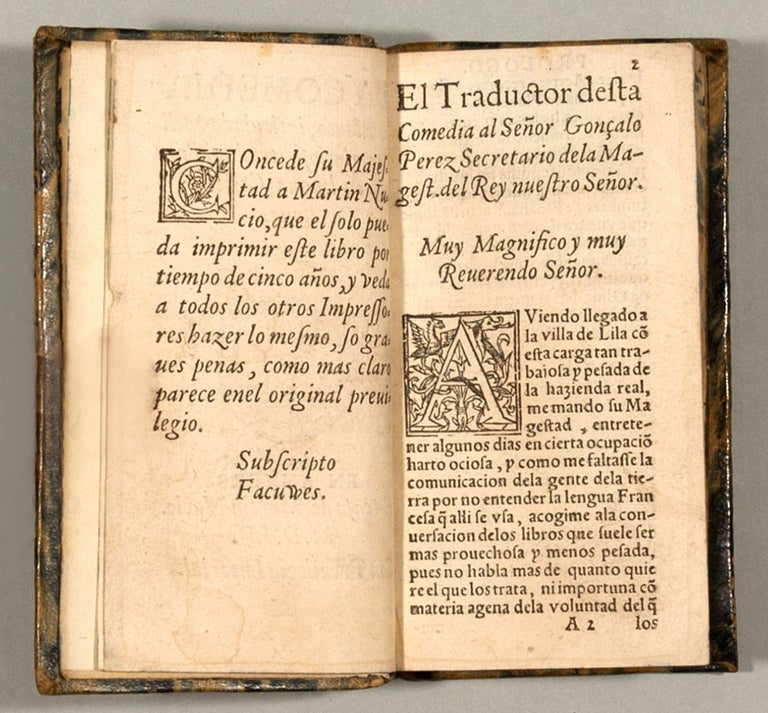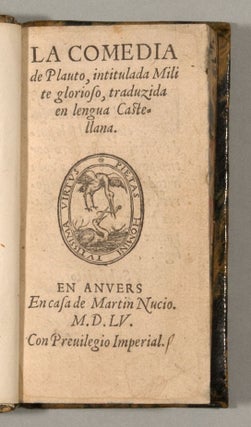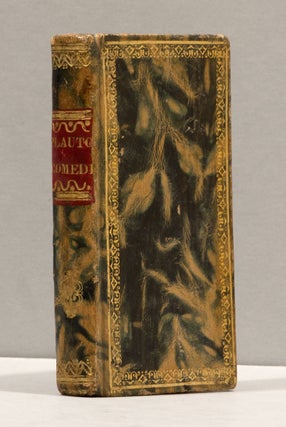La comedia de Plauto, intitulada Milite glorioso, traduzida en lengua Castellana. With: La comedia de Plauto, intitulada Menechmos, Traduzida en lengua Castellana por el mismo Author.
12mo [12.0 x 6.3 cm], 92 ff., (1 f.), (3) ff. integral blanks. Bound in 19th-cenury green pasta valenciana, red morocco title label laid to spine, gold-tooled spine, borders and board edges, floral printed endpapers, marbled edges. Only very minor rubbing to spine and boards. Internally very well preserved. Rare first edition (1555) of the first Spanish translations of Plautus’s (c. 254-184 B.C.) Miles Gloriosus and Menaechmi, two plays of considerable influence on the nascent theater of the Spanish Golden Age and on Renaissance drama more broadly. The Miles Gloriosus (The Vainglorious Soldier) has been called “the most celebrated play of Plautus” (Grismer, The Influence of Plautus in Spain before Lope de Vega, p. 113), while the Menaechmi (The Brothers Menaechmus) ranks as perhaps his most influential. These two pieces provide in abundance the wit, droll urbanity, skepticism, playfulness and rapid plot twists for which Plautus has come to be celebrated and according to which 16th- and 17th-century playwrights developed modern forms of comedy. “Medieval Spain saw the rise of comedias elegíacas, Latin verse that incorporated Plautine passages into dialogue. In the Siglo de Oro … translations began to appear, notably Amphitryon by López de Villalobos (1517) and F. Pérez d’Olivia (1530). In 1559 Juan de Timoneda published Tres comedias, which included two lively, free versions of Plautine plays, Amphitrión and Los Menemnos [the second Spanish translation] … The Seville native Lope de Rueda (1510-1565) wrote five plays in imitation of Plautus … Although Lope de Vega [1562-1635] self-consciously proclaimed independence from classical models, he used Plautine traditions innovatively … Plautus and Terrance deeply influenced the comedia de figurón, starring a ridiculous figure who personifies a flaw or vice; they also influenced the enormously popular comedia de capa y espada (the cloak-and-sword comedies), composed of romantic plots, intrigues and deceits” (Grafton, p. 741). Lope de Rueda’s (1510-65) Los Engañados (1567) and Medora (1567), which rely heavily on the Menaechmi (and to a lesser extent the Miles Gloriosus), are especially interesting in that Lope, the son of the goldsmith, had no Latin education, and so almost certainly had direct access to Plautus only though translations such as those found in the present volume. (Grismer, pp. 186-87). The anonymous translator notes in the prologue of the present volume that he translated Plautus into Spanish while stationed in Lille and, not knowing French, found himself unable to pass time in conversation with those around him. He cites as an inspiration Fernan Perez d’ Olivia’s (c. 1492-1533) translation of Plautus’ Amphitryon and closes with a Latin tetrastich dedicated to the poet Gonzalo Pérez, whose translation of Homer’s Odyssey had recently been published (La Ulyxea, 1550), also in Antwerp. During the ‘Antwerp period’ of Spanish printing, between about 1545 and 1570, the city produced more Spanish-language titles than did printers working in Spain itself. (Fenlon, p. 200). The small, ‘pocket’ format of this edition further reflects the new popular appeal of Plautus’s plays. OCLC locates copies at the Herzog August Bibliothek, Staatsbibliothek zu Berlin, Oxford, Biblioteca Nacional de España, and the BnF. * Palau 228780; Heredia, 2228; J. Peeters-Fontainas, Pays-Bas Méridionaux, 1065; R. L. Grismer, The Influence of Plautus in Spain before Lope de Vega; L. Fernández de Moratín, Orígines del Teatro Español, pp. 133, nos. 86 and 87; C. Alberto del la Barrera y Leirado, Catalogo bibliografico y biografico del teatro antiguo español, p. 565; B. García-Hernández, et. al., “La recepción de Plauto y Terencio en la literature Española,” in Ancient Comedy and Reception, S. D. Olson, ed., pp. 606-53; A. Grafton, et. al., eds., The Classical Tradition; R. F. Hardin, Plautus and the English Renaissance of Comedy; I Fenlon, Specialist Markets in the Early Modern Book World.
Sold



